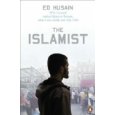A Religion of Second-Class Boys
The Islamist
Why I joined radical Islam in Britain,
what I saw inside and why I left
Ed Husain
by Scooper
November 2008
Beware of extremism in religion; for it was extremism in religion that destroyed those who went before you. — The Prophet Muhammad (pbuh)
In contrast to Daveed Gartenstein-Ross, Ed Husain was born into Islam, and raised by his parents (first generation immigrants from India and Bangladesh to the UK) with a good foundation in traditional Islamic spirituality. They followed a well-established spiritual teacher, who had followed a teacher before him, and so on, ostensibly back to the Prophet and his Companions. His earliest secular educational experiences also seem to have been pleasant, thanks to liberal "colour-blind" British schoolmarms. But to many "native" Brits, including some of his schoolmates, he was still a bespectacled "Paki." He did not "fit in." Neither did he fit in with the Bollywood enamored Bangladeshi boys at his next school. Fitting in with one's peers is the externalization of the inward quest for identity. When one is young "Who am I?" and "Who will have me?" are two faces of the same coin. The coin which with you can be seduced to sell your soul.
Ed decided to strike out in his own direction. He asked his school if he could study Religious Education after hours to learn more about Islam. Eventually a sympathetic Church of England British teacher took on the project using as a text Islam: Beliefs and Teachings by Gulam Sawar. It contained a remarkable passage, which Ed quotes
Religion and politics are one and the same in Islam. They are intertwined. We already know that Islam is a complete system of life ... Just as Islam teaches us how to pray, fast, py charity and perform the Haj, it also teaches us how to form a state, run a government, elect councillors and members of parliament, make treaties, and conduct business and commerce.
This text was still being widely used in the UK as a "moderate" textbook, and the opinion voiced in the above paragraph is taken as obvious truth by the UK and Western press generally. But Ed, a born Muslim, was surprised by this paragraph when he first read it, and would later be able to de-bunk it. It turns out that Sawar was not a religious scholar, but a business management lecturer, and a sympathizer with if not a member of the Muslim Brotherhood and Jamat-e-Islami, two radical Islamist organizations dedicated to the establishment of a world-wide "Islamic State." Such a concept is touted as being straight from the Prophet and his Companions, but it is really a graft from Marxism onto Islamic Fundamentalism, which is itself bida, a modern innovation in reaction against modernity.
Under the influence of Brother Falik, the first real friend he ever had, Ed joins a mosque that has been taken over, "colonized" as it were, by Jamat-e-Islami, to the horror of his traditionalist Muslim parents. The method of colonization relied on the innocent sounding Young Muslim Organization. No pious bearded old men to interfere here - just cadres of activist youth organizing events to proselytize for the radical Islamism of the Jamat-e-Islami. JI's intellectual founder is Abdul Ala Mawdudi, a Pakistani journalist, who "translated the Koran according to his own whims, without reference to or within the paradigm of classical Muslim scholarship." Mawdudi "rebranded" Islam as an ideology instead of a religion, and founded the JI to market his concept. It has since sold well to Muslim youth, who in their adolescent rebellion against their parents and their societies, are received into radical Islam.
In college, Ed left Falik and Jamat-e-Islami to join the even more militant Hisb-ut-Tahrir, which is organized into small cells, like the European Red Brigades of the 1970s and 1980s. Ed describes how the Hizb use Marxist agitation-propaganda techniques to colonize other Muslim organizations, all the while using innocent sounding names and never their own. Banned in Pakistan and the Middle East for its violence-inciting rhetoric, Hisb ut Tahrir and organizations like it flourish in the free societies they condemn. (They see the Western concept of indifidual freedom as sin, an exaltation of self-will over God's will.) The Hisb, it turns out draws its inspiration from works by Hasan al-Banna, Syed Qutb and others who elaborated on Mawdudi. None of these men is a recognized Islamic scholar, and all of them knowingly or unknowingly grafted onto Islam categories of nihlist and anti-rationalist thought they absorbed from the West that they hated so much.
Ed's journey out of radical Islam bgan with a murder committed by one of his radical friends. His internal moral sense (which radical Islamists denigrate - how dare you judge God!) caused him to be repelled by the actuality of the violence his own rhetoric extolled. Gradually, he comes under the influence of real Islamic scholars and historians, and returns to the traditional Islam of his parents. Sojourns in Syria and Saudi Arabia confirm to him the misery of existence in societies that approximate the "Islamic State." He also discovers his Britishness: all his life he had taken basic human rights and basic fairness for granted, out of habit. British habit, it turns out.
Ed ends up discovering his own identity as simultaneously authentically Muslim and authentically British. He thus embodies Islam augmented not by the worst ideas of the West, but by the best. Like liberal democracy and freedom of religion, including the freedom of Muslims to be Muslim as inspired by God rather than as dictated by some self-aggrandizing "authority."
Ultimately, identity is the central theme of Ed's journey into and out of radical Islam. He had formed a youthful identity as a second-class Brit, and was drawn to radical Islam's promise to make him instantly a first-class citizen of the nascent Islamic State. Thus he exposes radical Islamism as a religion of second-class boys.

